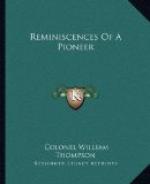As a small boy I remember the first mention of California, the land of gold. My father returned from New Orleans in January. On board the steamer coming up the Mississippi river, he had fallen in with some gentlemen “returning to the States.” They had given him a glowing description of the “land of gold,” and almost the first words spoken after the family greetings were over was, “We are going to California in the spring.” My mother was more than agreeable and from that time nothing was talked or thought of but the journey to California. The old refrain was sung from morning to night,
“In the spring we ’re
going to journey,
Far away to California.”
My chum, Tant, a negro boy of my own age, and I seriously discussed the prospects and dangers of the journey. Direful tales of the tomahawk and scalping knife were recounted by the older children. But Tant’s fears were allayed by the assurance that the “Injuns” would not kill and scalp a black boy with a woolly head. For once in my life I envied that imp of darkness.
In February a gentleman came to our home and after dinner he and my father rode over the plantation. The next morning they rode over to Bolliver, the county seat. Returning in the evening my father announced that the plantation was sold. Then began the real preparations for the journey. My father was constantly in the saddle. Oxen, wagons, ox yokes, ox bows, cattle, covers for wagons, arms, ammunition and provisions were purchased and brought to the plantation. All was hurry and excitement. Two shoemakers came to our home to make up the leather purchased at St. Louis or from neighboring tanneries. Meantime Aunt Ann and the older girls of the family were busy spinning and weaving. Every article of wearing apparel must be made at home. “Store clothes” were out of the question in those days. Wool must be carded and spun into thread for. Aunt Ann’s old wooden loom. The cloth was then fashioned into garments for clothing to last a year after we should reach our goal far out on the Pacific shores. The clank of the old wooden loom was almost ceaseless. Merrily the shuttle sang to an accompaniment of a camp meeting melody. Neighbors also kindly volunteered their services in weaving and fashioning garments for the family. All was bustle and hurry.
At last all was in readiness for the start. Spring with all its beauty and glory was with us, and friends from the country round and about had come to bid us a final farewell—friends, alas, we were destined never to meet again. The parting I remember as the first real sorrow of a life that has experienced most of the hardships, dangers, privations and sufferings of a wild frontier life. It was a beautiful morning early in April, 1852, that the leaders were pointed to the west and a start was made. Four wagons were drawn by five yoke of oxen each, while the fifth, the family wagon, was drawn by three yoke.




